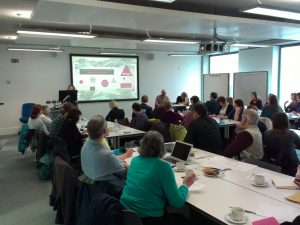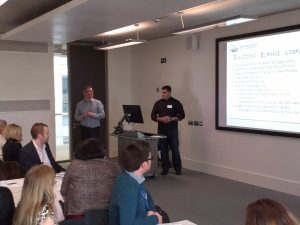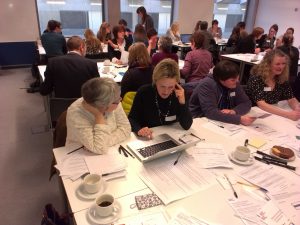
The organisers of this CILIP IL Group-sponsored event have kindly provided the following report:
Wednesday 22nd January was the inaugural CILIP ILG sponsored Manchester Metropolitan University (MMU) LibTeachMeet. This saw a sold out gathering of 50 folks from around the country stuffing biscuits and snaffling the many freebies (kindly provided by numerous library suppliers) together in a room in the University’s brand new Business School.
Talks could be on anything related to information or digital literacy, and we saw a really good range of 10-minute presentations from a variety of brave souls!
First up was the sparky Ros Bell from the University of Manchester, running a super-quick Techknowledgy taster session. Ros’ Techknowledgy sessions are aimed at University staff and she took this opportunity to tell the LibTeachMeet about a few interesting resources to support group work, which many of us had never come across before: Yammer (a sort of ‘work Facebook’), Asana (recommended as a time management tool for groups and individuals) and Padlet (basically a blank wall to which people can post text, images, documents, etc.).
Stepping up next was the bubbly Angela Duckworth from Liverpool Hope University, talking about some of the games they use in information and digital literacy teaching sessions. Each academic year group has different training requirements. Year 1s have a library treasure hunt, complete with mock catalogue records, mock books and £50 Amazon vouchers; Years 2 and 3 have the developing search strategies ‘Fruit game’ (see Angela’s presentation slides and all will become clear!). In another game, postgraduates evaluate real and mock resources by using cards with various descriptions, such as ‘up-to-date’ or ‘neutral content’, to describe those resources. The use of this method prompted some valuable discussions with those students.
MMU Research Associate Sarah McNicol introduced InFlow, an integrated model of applied information literacy. InFlow aims to engage students with information by encouraging them to work in a series of related ‘flows’ that can be undertaken in any order, rather than via the more traditional series of discrete tasks. Sarah provided examples of how the model can be applied to a typical student assignment, breaking down the processes of planning the assignment, researching it and making a final presentation in terms of ‘flows’. Sarah is running a workshop on InFLow in early April, after which it is hoped it will be put into place by practitioners. Presentation slides.

In a move away from Higher Education, Tom Northey & Ethar Alali from the Friends of Burnage Library laid down some of their plans for supporting digital inclusion and digital and information literacy in the community-run Burnage Library. These included revamping the IT services, running coding classes and homework, Lego and film clubs, and developing outreach programmes with schools and other groups. We think everybody was impressed by the level of research the group had carried out into library use and their local community, and Tom and Ethar’s enthusiasm and positivity was wonderful to see! Presentation slides.
Alison Kaye from the University of York told us about the development of a digital literacy framework at York. A work in progress, the framework aims to help ensure that students can develop the general attributes desired by the University in a digital literacy setting. Alison explained how they had formalised what an ideal graduate would possess in terms of digital literacy and how they developed a list of definitions for the skills and understandings that make up the framework. Clear diagrams were used to illustrate how the York team feel that skills, practice and understanding will all have to be emphasized equally if students are to attain the aforementioned attributes. This work has been undertaken by the Library and IT department at York and has not been approved or adopted by the University as a whole, so it will be really interesting to see how the project develops and how far the team can take it! Presentation slides.

The midway point of the afternoon featured a swapshop. We’d asked all delegates to bring examples of learning material they use during information/digital literacy sessions to share with colleagues. Judging by the noise levels and enthusiastic nodding going on (as well as the post-mortem feedback!) people relished this opportunity to compare notes with their peers!
After the break, the über-deadpan Terry Dooley from Manchester Metropolitan University Library stepped up with witty tales of persuading academic staff to let him run information literacy sessions for their students. Techniques ranged from cold calling (“Who is this?!”), to threatening to cancel academics’ beloved (but used exactly 0 times in the previous year) journal subscriptions, and Terry relayed them with a great sense of humour. Presentation slides.
Jo Richler, an ex-librarian from Ciel Associates, shared her unique experience of the challenge of merging three libraries (one FE, one HE and one public) in a single building in Southend. As would be expected, there were numerous conflicts surrounding practical issues – use of different classifications systems being but one example. Another major issue was the lack of a room to deliver information literacy sessions. However, the close physical working arrangements have successfully led to the FE and HE librarians collaborating to design and deliver IL sessions, as they can more easily identify the training needs of students both before and after they reach university.
Nicola Beck, also from Manchester Metropolitan University Library, discussed how the Library has been working alongside several other stakeholders within the University, such as IT Services and the Centre of Excellence in Learning & Teaching (CELT), to deliver a comprehensive, institution-wide digital literacy training programme. Presentation slides.
Finally, Nicola Sales from Salford University spoke about using the Flipping the Classroom teaching method to deliver legal research training. She had found that her IL sessions looked great on paper, as they gave her a total of 6 hours to impart her wisdom in a lecture theatre. Unfortunately, only about 10% of students attended. So, over a three month period, Nicola created and posted a series of short videos on the University’s VLE, releasing each series about two weeks before a particular lecture. The aim was that the students would view these videos prior to the lecture, freeing up lecture time for questions, discussions and practical exercises, such as producing mind maps. At the first session, 70% of students had completed the preparation and enthusiastically participated in discussions. Those who hadn’t felt peer pressure to do so and, by the second lecture, preparation was at 90% and attendance at 91%! Presentation slides.
The final half hour of the day involved a Q&A session with a panel comprising all the day’s presenters, followed by an audience vote for the star presenter. Nicola Sales won the vote and was the well-deserved winner of a £20 Amazon voucher, kindly funded by CILIP ILG, and a book, ‘Digital Dieting’ by Tara Brabazon, from Ashgate Publishing.
Judging by the feedback following the event, the delegates enjoyed themselves and felt it was worthwhile attending. We can’t wait to see who plucks up the courage to flip the classroom next!
As first-time LibTeachMeet organisers, we feel we learned a lot from this event. The swapshop was a real success, the breadth of speakers was welcomed by attendees and the format of the afternoon allowed us to stick to time effectively. However, we also took away a list of ‘things-to-do-differently-next-time’ – we found that a reception desk is not needed if the room is well signposted and that providing a schedule and list of delegates beforehand is a must.
So, plenty to build on for next time!
